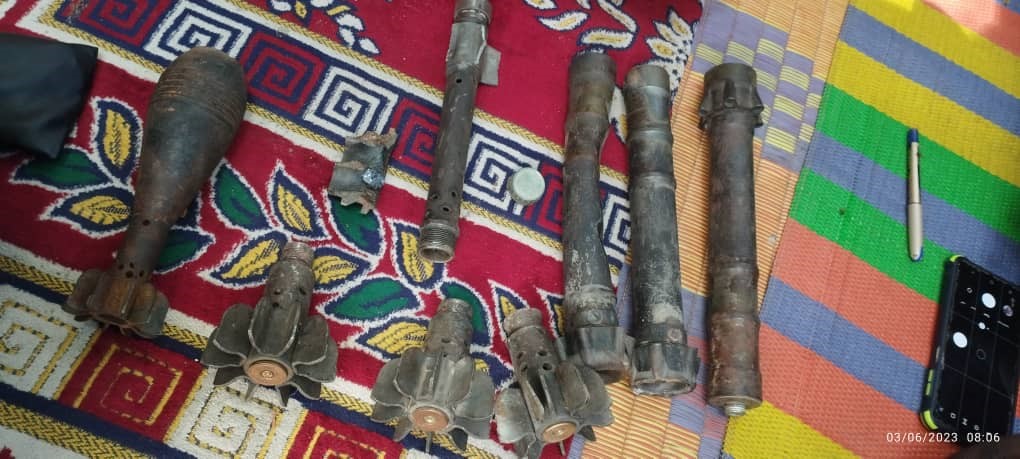Intensified fighting grips Sudan, humanitarian crisis deepens

Unexploded ordnance found around El Geneina in June, 2023 (Photo: RD)
KHARTOUM / OMDURMAN / KHARTOUM BAHRI / NYALA / EL OBEID –
The war between the Sudanese army and the Rapid Support Forces (RSF) has entered its third month, with clashes escalating in multiple cities across the country. Khartoum, El Obeid, and Nyala have witnessed intensified fighting.
In Omdurman, battles raged on in various neighbourhoods, including El Mohandesin and El Arda, as well as in El Salama and El Azhari neighbourhoods in Khartoum. Resident Bashir El Sadig reported that the army has employed warplanes, artillery, and infantry in its attacks against the RSF.
The RSF increased their presence in areas such as Haj Yousif and Sharg El Nil in Khartoum North and in Abu Adam and El Kalakla in Khartoum. In response to the violence, residents in some neighbourhoods resorted to digging trenches on roadways and organising patrols conducted by youths.
People in Khartoum are suffering from a lack of essential medicines, especially kidney medications, as well as continuous water and electricity cuts.
Fighting in Nyala
Nyala, the capital of South Darfur, experienced renewed fighting between the army, RSF, and other armed groups. On Tuesday, two people, including Osman Hamed, the financial director of Nyala’s northern locality, were killed when shells hit their homes.
Dozens of gunmen robbed shops in the popular market of Nyala, according to local accounts. Traders expressed concern to Radio Dabanga about the lack of security measures and called upon army forces and RSF to protect them.
El Obeid
In El Obeid, capital of North Kordofan, the Sudan Armed forces (SAF) launched aerial bombardments targeting RSF positions on the outskirts of the city. The shelling displaced 64 families from western neighbourhoods, and tensions rose as the RSF conducted searches and imposed levies on transport vehicles. El Obeid Hospital reported no civilian deaths or injuries from the airstrikes as of Wednesday noon, but the shelling caused significant disruption and heightened tensions.
In the nearby town of El Rahad, people had to dig trenches at neighbourhood entrances to prevent further attacks, after armed groups entered the town on Land Cruisers and robbed people, according to local sources.
Humanitarian toll
The Sudanese Doctors Union reported that since the start of the war, 958 civilians have been killed, with 4,746 injured. The Ministry of Health for its part disclosed that, between April 15 and June 6, at least 866 people were killed and over 6,000 injured nationwide. The recent period from May 27 to June 12 witnessed the deaths of 92 people and the injury of 680 others, mostly concentrated in Khartoum and El Obeid.
The conflict has taken a severe toll on the healthcare system, with shortages of essential supplies and medicines reported. Four displaced people from Khartoum died because of medication shortages at Kosti Hospital in White Nile state. The United Nations Office for the Coordination of Humanitarian Affairs (OCHA) has reported that around 67 per cent of hospitals near conflict zones in Sudan are currently non-operational, further exacerbating the crisis.
The latest International Organisation for Migration’s (IOM) Displacement Tracking Matrix shows that since the outbreak of the war, 1,670,991 individuals (334,517 households) have been displaced in Sudan. Having been uprooted from six conflict-affected states, the newly displaced people have sought shelter across all 18 states of Sudan. Another 528,147 people sought refuge in neighbouring countries.








 and then
and then